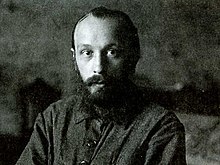Mikhail Bakhtin
Russian intellectual and philosopher
Mikhail Mikhailovich Bakhtin (17 November 1895 – 7 March 1975) was a Russian philosopher, literary critic, semiotician and scholar who worked on literary theory, ethics, and the philosophy of language.

| This article about a philosopher is a stub. You can help out with Wikiquote by expanding it! |
Quotes
edit"Discourse in the Novel" (1935)
editC. Emerson and M. Holquist, trans., in The Dialogic Imagination (1981)
- The word ... becomes "one's own" only when the speaker populates it with his own intention, his own accent, when he appropriates the word, adapting it to his own semantic and expressive intention. Prior to this moment of appropriation, the word does not exist in a neutral and impersonal language (it is not, after all, out of a dictionary that the speaker gets his words!), but rather it exists in other people's mouths, in other people's contexts, serving other people's intentions.
- pp. 293-294
- Not all words ... submit equally to this appropriation, to this seizure and transformation into private property: many words stubbornly resist, others remain alien, sound foreign in the mouth of the one who appropriated them and who now speaks them; they cannot be assimilated into his context and fall out of it; it is as if they put themselves in quotation marks against the will of the speaker.
- p. 294
- Language is not a neutral medium that passes freely and easily into the private property of the speaker's intentions; it is populated—overpopulated—with the intentions of others.
- p. 294
Quotes about Bakhtin
edit- The suggestion of Bakhtin's total oeuvre, conceived as a single utterance, is that our ultimate act of authorship results in the text which we call our self.
- Michael Holquist, "Answering as Authoringː Bakhtin's Trans-Linguistics," in Gary Saul Morson, ed., Bakhtinː Essays and Dialogues on his Work, University of Chicago Press, 1981, at p. 67.
- My two favorite theorists are Kristeva and Bakhtin, both of them because they see writing as infinite possibility, in which one plays with cultural and linguistic conventions rather than being limited by them.